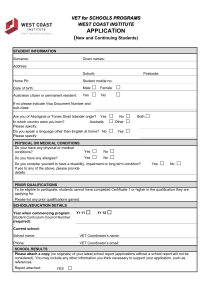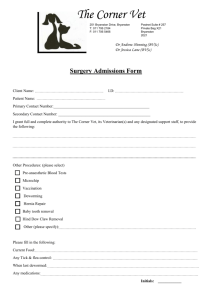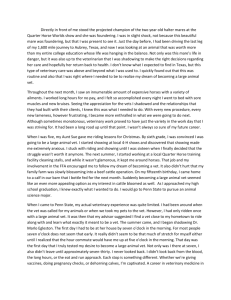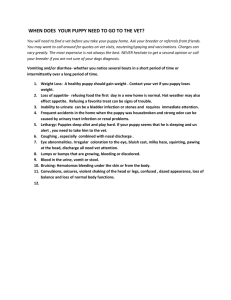Q&A Session with Ashley Case: Applying/Once You`re In
advertisement
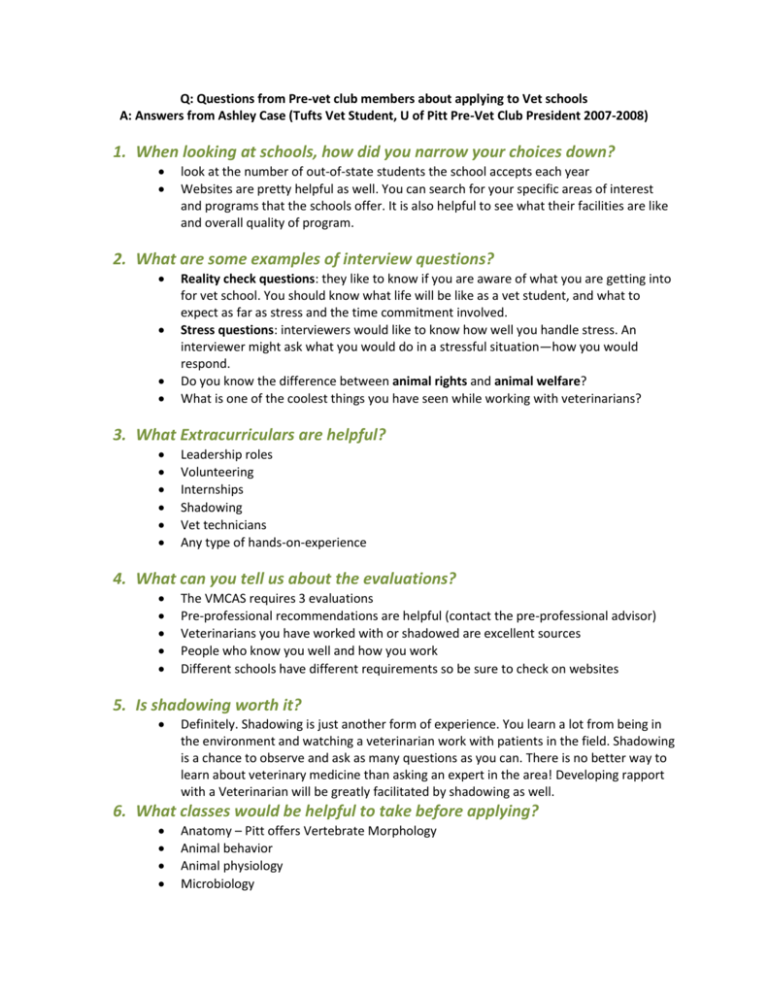
Q: Questions from Pre-vet club members about applying to Vet schools A: Answers from Ashley Case (Tufts Vet Student, U of Pitt Pre-Vet Club President 2007-2008) 1. When looking at schools, how did you narrow your choices down? look at the number of out-of-state students the school accepts each year Websites are pretty helpful as well. You can search for your specific areas of interest and programs that the schools offer. It is also helpful to see what their facilities are like and overall quality of program. 2. What are some examples of interview questions? Reality check questions: they like to know if you are aware of what you are getting into for vet school. You should know what life will be like as a vet student, and what to expect as far as stress and the time commitment involved. Stress questions: interviewers would like to know how well you handle stress. An interviewer might ask what you would do in a stressful situation—how you would respond. Do you know the difference between animal rights and animal welfare? What is one of the coolest things you have seen while working with veterinarians? 3. What Extracurriculars are helpful? Leadership roles Volunteering Internships Shadowing Vet technicians Any type of hands-on-experience 4. What can you tell us about the evaluations? The VMCAS requires 3 evaluations Pre-professional recommendations are helpful (contact the pre-professional advisor) Veterinarians you have worked with or shadowed are excellent sources People who know you well and how you work Different schools have different requirements so be sure to check on websites 5. Is shadowing worth it? Definitely. Shadowing is just another form of experience. You learn a lot from being in the environment and watching a veterinarian work with patients in the field. Shadowing is a chance to observe and ask as many questions as you can. There is no better way to learn about veterinary medicine than asking an expert in the area! Developing rapport with a Veterinarian will be greatly facilitated by shadowing as well. 6. What classes would be helpful to take before applying? Anatomy – Pitt offers Vertebrate Morphology Animal behavior Animal physiology Microbiology 7. What classes have you taken in your first year so far? Physical Chemistry Developmental Anatomy Gross Anatomy (lab and lecture) Problem based learning Human-animal relationships i. Welfare vs. rights ii. In research Histology Immunology Physiology 8. Do you have any tips on applying or getting experience? When trying to find experience opportunities, send out a resume and cover letter to several different places of interest. Make sure to follow-up and call back to make sure your information has been received and also to check the status of things. Calling and keeping up with things shows that you are dedicated and interested. Shadow a veterinarian and work your way into working for them I shadowed a Penn Vet school graduate who had applied three times before being accepted. The following gives an overview of her experience and what helped her get into U of Penn Veterinary School: i. She applied the first year, but was rejected. She called and asked why she was not accepted and what she could do to help her out ii. She was told to do 3 things: 1. Improve the GRE score 2. Get more experience 3. Retake a course (specific course unknown) iii. After doing 2 out of the 3 requests, she applied the second time around, but was rejected. She called to ask why and was told that she only completed 2 out of the 3 things that Penn had told her to complete iv. She finished the third task, applied the third year, and was accepted! Stay focused, be persistent, and work hard Thank you again, Ashley, for coming to share your experience with vet school applications and your first year at Tufts University.

